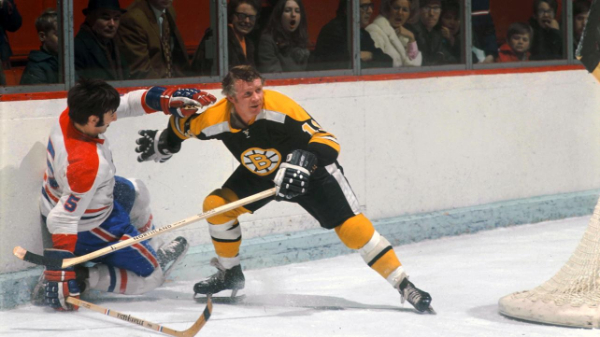
By: Andrew Lindroth | Follow me on Twitter! @andrewlindrothh
John Mckenzie was born on December 12th, 1937, in High River, Alberta, Canada. He began playing juniors as a 16-year-old forward for the Calgary Buffaloes (WCJHL) and the Medicine Hat Tigers for two years. When he turned 19, he transferred to the OHA-Jr. League and played for the St. Catharines Teepees (OHA-Jr.) from 1956-1958. He led the league in points and goals in 1958, recording an astounding 48 goals and 99 points in just 52 games. He played his final string of games in juniors at the start of the 1958-159 season before being acquired by the Chicago Blackhawks (NHL).
The 5’9, 170-pound winger was immediately promoted to the National Hockey League during the 1958-1959 season and appeared in 32 games as a Blackhawk, potting three goals and seven points. His journey in Chicago abruptly ended on June 10th, 1959, when the Detroit Red-Wings claimed him during the Intra-League Draft. McKenzie went on to suit up for Detroit the next two seasons. Still, after scoring only four points in just 16 games during the 1960-1961 season, Detroit officially demoted him to the American Hockey League. After being assigned to the Hershey Bears that season, he finished with 19 goals and 42 points in 47 games.

Although McKenzie was nearly a point-per-game player his first year in the AHL, Detroit decided to have the forward continue developing with the Hershey Bears (AHL) the following season. This time, the forward finished the season as a point-per-game player, notching 30 goals and 59 points with 149 PIM in 58 games. On June 5th, 1962, McKenzie’s tenure with the Detroit organization comes to an end when they trade him and Len Lunde to the Chicago Blackhawks in exchange for Doug Barkley.
The pesky winger continued development in the AHL the following season, suiting up for Chicago’s affiliate, the Buffalo Bisons, and was one of the league’s most productive players, racking up 35-46-81 numbers, including 122 PIM in 71 games. He was also named to the league’s First All-Star Team in 1963. After paying his dues for three years in the AHL, McKenzie finally earned the opportunity to play in the NHL again the following season.
The resilient 26-year-old fought his way back to the NHL but immediately struggled with several injuries, limiting him to playing in only 96 games from 1963-1965. McKenzie struggled to maintain offensive consistency during those two campaigns and combined for 17 goals and 36 points. On June 4th, 1965, Chicago decides to end the reunion with McKenzie and trades him and Ray Cullen to the New York Rangers in exchange for Tracy Pratt, Dick Meissner, Dave Richardson, and Mel Pearson.
McKenzie struggled tremendously during the first half of the 1965-1966 season, collecting 11 points with a minus-17 rating in 35 appearances. He was exhibiting defensive deficiencies and was not generating consistent chemistry with his offensive line-mates. The Rangers decided to cash-in on McKenzie before the trade deadline and traded him to the Boston Bruins in exchange for Reggie Fleming. He finished the season scoring an additional 12 goals and 22 points, marking what would be the start of his legendary career as a Bruin.

McKenzie improved offensively but continued to show defensive deficiencies the following season, scoring 17 goals and 36 points with a dragging minus-36 rating. He did rack up nearly 100 PIM that season and began to really earn his reputation as a pesky, physical player that throws opponents off their games. The 30-year-old finally had his ‘breakout’ season that solidified him as a star-player during the 1967-1968 season, scoring 28 goals and 66 points along with a plus-14 rating and 107 PIM in 74 games. Age meant nothing to McKenzie and continued his stellar play over the next few years.
In the 1968-1969 season, McKenzie appeared in 60 games due to minor injuries but still managed a career-high 29 goals and 56 points with 99 PIM. He also led the league in shooting percentage with an impressive 23.6%. The following season ends up becoming one of the most notable of his career. The 32-year-forward keeps his foot on the gas pedal and achieves offensive career-high numbers across the board with 29-41-70 numbers, a plus-20 rating, and 122 PIM. He was also named to the Second All-Star Team in 1970. McKenzie went on to help lead the Boston Bruins to their first Stanley Cup victory in 29 years, finishing fourth on the team with an astonishing 17 points in 14 games and finishing first on the team with three game-winning goals.
During the 1970-1971 season, McKenzie had the best offensive performance of his career, lighting the lamp 31 times with 77 points and a plus-27 rating while maintaining a whopping 20.5% shot percentage through 65 appearances. The following season ends up becoming his final year in the NHL, but he leaves a legacy with the Boston Bruins forever. The 34-year-old pest played in 77 games, contributing 22-47-69 numbers with a plus-20 rating and 128 PIM. He once again helped lead the Bruins to their second Stanley Cup victory in 1972, defeating the New York Rangers. McKenzie played a vital role in the Bruins’ playoff success, producing 17 points and led the league with a 26.3% shot percentage.
After the Boston Bruins won the Stanley Cup in 1972, the NHL Expansion Draft was scheduled for the following summer. The Bruins had to decide which players they wanted to protect from being selected in the draft, and unfortunately, McKenzie did not make the cut. Being left unprotected in the upcoming draft made the 35-year-old very frustrated and disgruntled, prompting his exit from the Bruins and the NHL as he packed his bags for the newly formed pro-hockey league, the World Hockey Association (WHA). On February 12th, 1972, McKenzie was selected by Quebec in the 1972 WHA General Player Draft.
Shortly after being drafted, Quebec traded his rights to the Philadelphia Blazers (WHA), and he served as a player-coach role on the team. McKenzie went on to play in the WHA for seven years from 1972-1979, suiting up for six different teams and producing 163-250-413 numbers with 619 PIM in 477 games. He officially retired from playing professional hockey in 1979 at the age of 41.
Throughout his 12-year tenure in the NHL, McKenzie recorded 206-268-474 numbers with a plus-26 rating and 923 PIM in 692 games. The two-time Stanley Cup champion was a significant piece to the Bruins’ success and will forever be remembered by Bruins fans for his pesky, tenacious play. John McKenzie passed away on June 9th, 2018, at 80 years of age.


Leave a Reply